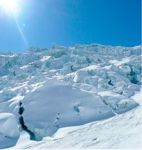The Arctic-HYDRA Program
 There is mounting evidence that the Arctic is today experiencing an unprecedented degree of environmental change and level of consolidation in this change – broad-scale increases in air temperature; reductions in sea ice cover; melting of glaciers; loss of permafrost; lengthened ice-free period in lake and rivers; and reductions in snow cover. From a hydrological perspective, the most indicative change involves trends in the discharge of major rivers in Siberia and North America, which deliver large amounts of freshwater to the Arctic Ocean. Recent analysis suggests ongoing redistribution of freshwater from the sub-Arctic into the high northern latitudes, which is consistent with concerns about an accelerated hydrologic cycle associated with greenhouse warming.
There is mounting evidence that the Arctic is today experiencing an unprecedented degree of environmental change and level of consolidation in this change – broad-scale increases in air temperature; reductions in sea ice cover; melting of glaciers; loss of permafrost; lengthened ice-free period in lake and rivers; and reductions in snow cover. From a hydrological perspective, the most indicative change involves trends in the discharge of major rivers in Siberia and North America, which deliver large amounts of freshwater to the Arctic Ocean. Recent analysis suggests ongoing redistribution of freshwater from the sub-Arctic into the high northern latitudes, which is consistent with concerns about an accelerated hydrologic cycle associated with greenhouse warming.
Our Partners
- ASIAQ, Greenland
- Danish Meteorological Institude, Denmark
- Environment Canada, National Hydrological Service, Canada
- Georgia Institute of Technology, USA
- Global Runoff Data Center, Koblenz, Germany
- Icelandic Meteorological Office
- ICARP II
- JAMSTEC, Japan
- NVE, National Hydrological Service, Norway
- State Hydrological Institute, Russia
- Stockholm University
- SYKE, National Hydrological Service, Finland
- The University of Turku
- University of Alaska, Fairbanks, USA
- University of Copenhagen, Denmark
- University of New Hampshire, USA
- University of Saskatchewan, Canada
- USGS Water Resource Office, Alaska Science Center, USA
- WMO HWR
- WMO WCRP/CliC


